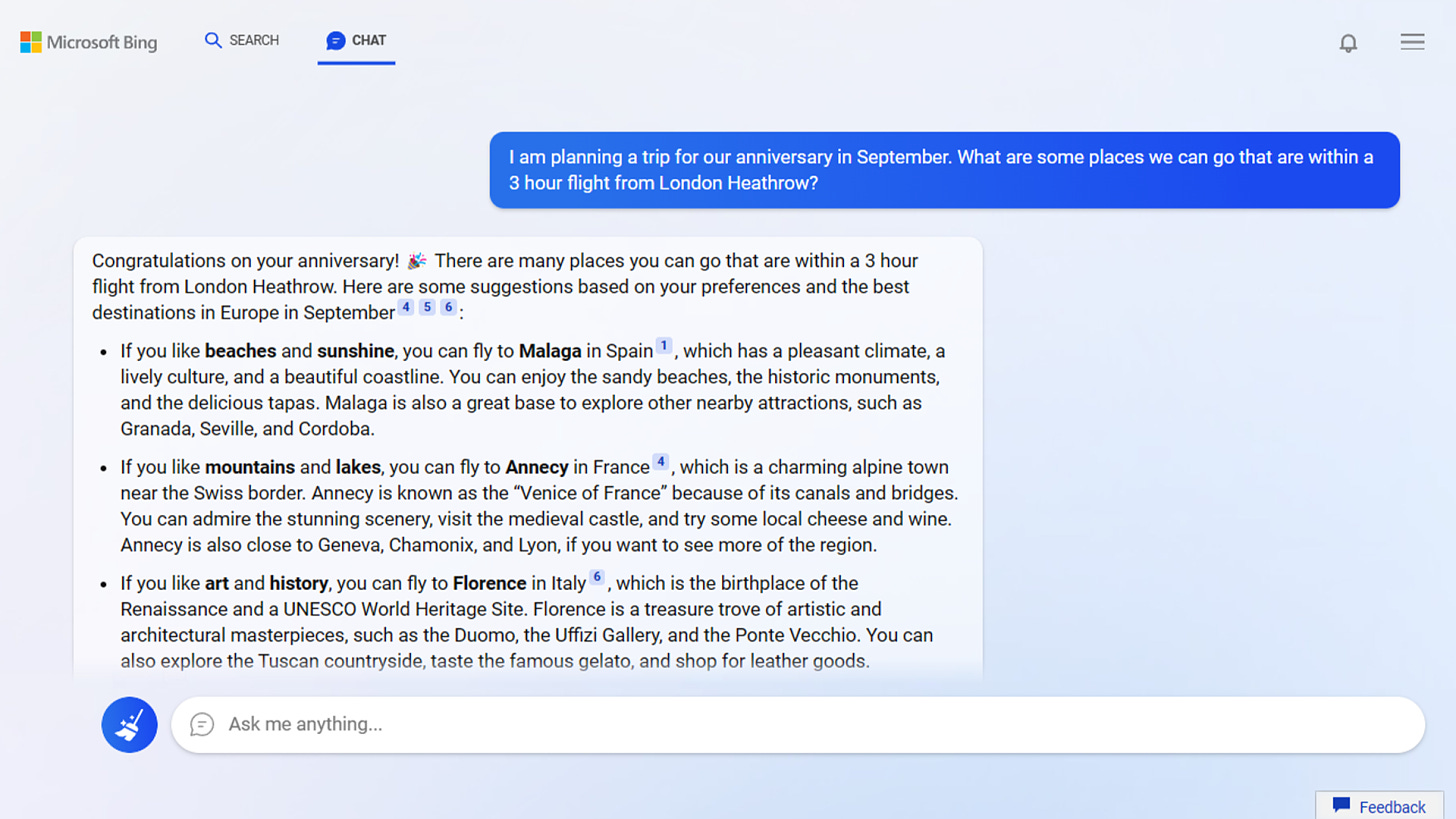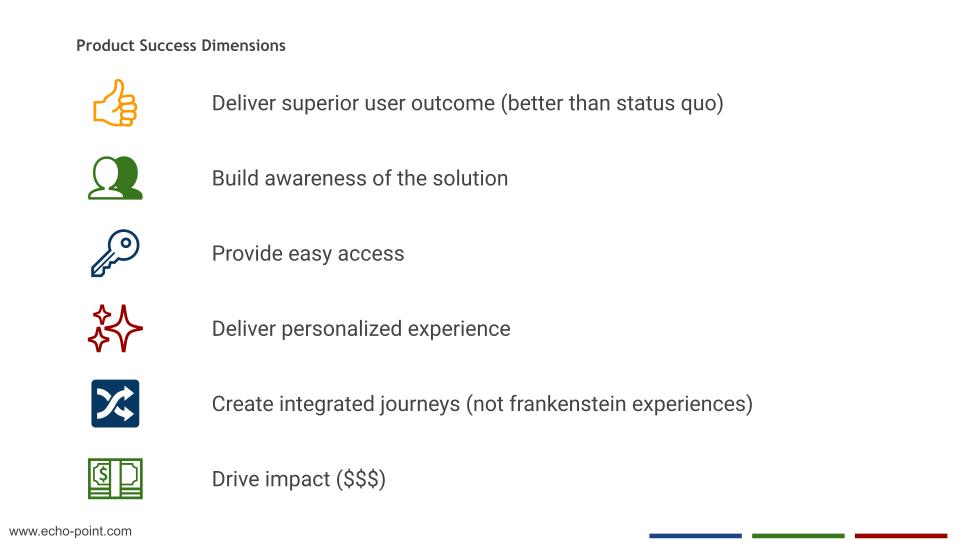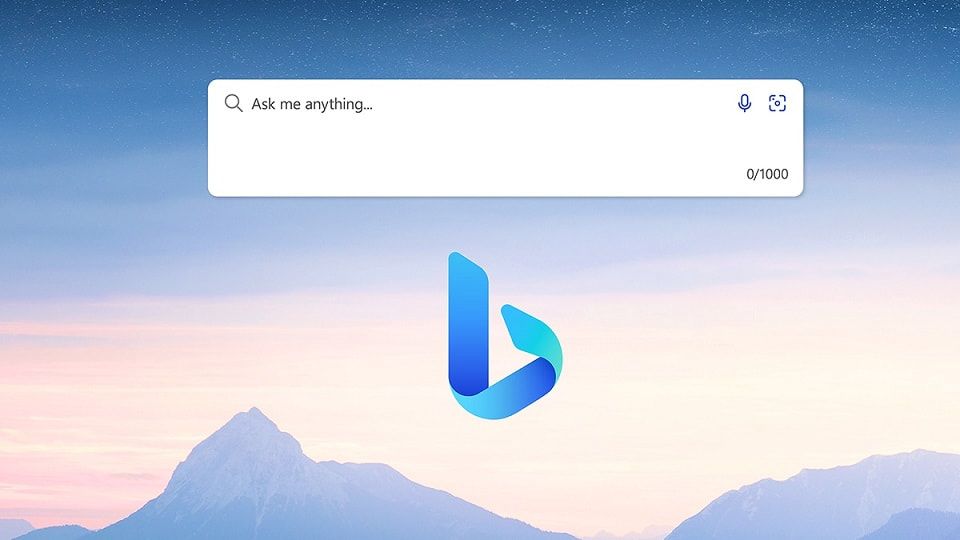Have you tried the new ChatGPT on Bing?
It is – awesome!!
The experience is surreal. At times you almost forget that you are chatting with a computer. If you have not had a chance to take it for a spin, I highly encourage you to do so.
Despite all the hype (positive and negative), this is truly a game-changer.
If the technology is that good, does this mean, Microsoft is going to win the new race in search?
Not so fast. Here is why…
- Microsoft’s new chat function is definitely better suited for certain types of searches (jobs to be done).
- But for a product to be successful, doing a “job” better than the status quo is not enough. The product has to solve for 6 key dimensions.
- By being first, Microsoft has made progress on 2 of the 6 dimensions. For it to win, it needs to have solutions for all 6 dimensions.
Let’s break it down….
Search and the three jobs to be done.
Did you catch Microsoft’s announcement about integrating AI into Bing?
It was a master class in jobs to be done.
At that event, Yusuf Mehdi, Corporate Vice President of Search laid out Search’s three jobs
- Navigational (1/3 of all searches): Searching for a website. E.g. “what is my local DMV’s website”?”
- Informational (1/3): Looking for simple information. E.g. “what is the weather like today?”
- Everything Else (2/3): Search that does not fit into neat categories, that require answers to complex questions. E.g. “Can you recommend a five-day itinerary to Mexico City.”
Microsoft is laser-focused on job #3 (everything else).
Google is great for jobs #1 and #2. But falls short for complex queries like #3.
Which is exactly what Microsoft is going after.
If you have played around with ChatGPT it is quite good at Everything Else. You can ask it questions like – “I am planning for our anniversary in September. What are some places we can go within a 3-hour flight from Heathrow?”

Questions on current events, “Did LeBron James set the NBA scoring record?”, and “When did Joe Biden visit Ukraine?”.
Complex questions like “Find similar examples like being invited to your friend’s party, where you are promised an amazing BBQ. Only to find out that all they have is chicken nuggets? ”.
Chat GPT is even good at asking existential questions like “What is love?”, “How would you describe yourself?”, and “Why is your answer different compared to the same question I asked earlier?”
Instead of millions of links, it responds to your query in long form answer. With the additional ability to answer follow-up questions.
A far superior outcome and user experience.
Being really good at a “job” is not enough.
A product is more than just the “job to be done”. Yes, being better than the status quo is important. But it is just one success dimension out of 6.
For a product to be successful, it needs to…

- Deliver A Better User Outcome: The product has to deliver a far superior experience and outcome than the status quo. User behavior is hard to change. If you are going to ask them to switch, it has to be worth their while.
- Increase Awareness: Users need to be aware that the functionality exists. You can have a great product but if no one knows about it, then what is the point?
- Provide Easy Access: There are two parts to access. First is convenience, how easily can the user access the product, without hurdles and roadblocks. And Second is immediacy, how quickly can the user start working on the job?
- Deliver Personalized Experience: Does the product know them well enough? Is it context-aware? Can users customize (choose avatars, background colors, use cases, etc.)?
- Create An Integrated Experience: How does this experience compare with the other jobs the product has? Are they connected? Do they fit with each other?
- Drive Impact: And last but not the least, what is the impact? How is the product going to help the organization make/save money?
By being the first to launch, Microsoft has made good progress on 2 of the 6 criteria.
Microsoft has made good progress on the following 2 dimensions
- Superior User Outcome: We have already established that ChatGPT responses are far superior to regular search for the “everything else” job category.
- Access: Integrating ChatGPT right into the browser was a smart move. It has made access easy and immediate. You can access it under “chat”, similar to how users search for “images” or “videos”.
Unfortunately, this progress will be quickly neutralized. Google is coming.
By being first to market, delivering a superior experience/outcome, and making it easy to access. Microsoft has clearly shown what is possible.
But the advantage is short-lived.
Once Google releases its own version (Bard), even if Bard delivers a similar or slightly less experience than Bing, its structural advantages, across access, awareness, integration, etc. will help them carry the day.
Also, I would not put too much stock into the current narrative that the AI that has better / more accurate answers wins. Since both AIs pull their data from the same internet, the quality of results will be more or less the same.
For Microsoft to win, it needs to lean heavily into the other success dimensions.
In addition to making Bing better, here is what it needs to do…
- Build awareness and provide users with a compelling reason to switch to Bing. Microsoft did a good job building awareness with the press conference. But the buzz is limited to Silicon Valley and technology enthusiasts. Worldwide there are 10 billion queries a day. Bing is a small fraction of that.
- Improve access beyond just desktop browser, especially on mobile phones. Integrating ChatGTP into Bing was a smart idea. But that is only if you use desktop browsers. Most searches are conducted via phones. And Microsoft has a limited search presence on iOS or Android phones.
- Make ChatGTP more personal. Right now if you and I ask the same question, we will probably get similar results. Microsoft has a huge opportunity to make its AI into a true personal assistant.
- Lean into its competitive advantage. Google Search is embedded in everything Google does – web, browsers, workspace, cloud, and mobile. Microsoft needs to take a similar orthogonal strategy. It needs to integrate ChatGPT into its center – Office, Windows, Xbox, and Azure in novel ways.
- Figure out a monetization strategy. This is a complete unknown. Search links can be monetized. But not sure about long-form responses. No model exists for it yet.
For me, #5 remains the biggest challenge and opportunity for Microsoft (and Google). Whoever cracks that nut, wins.
Happy building!!

